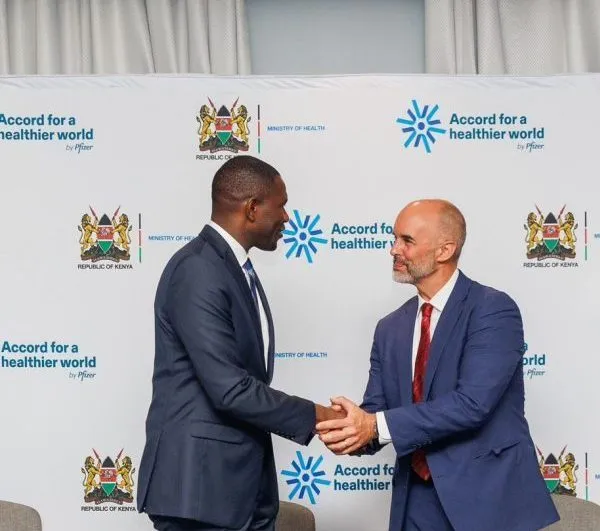Kenya’s Ministry of Health has signed a landmark agreement with global pharmaceutical giant Pfizer to provide over 140 essential medicines on a not-for-profit basis. The deal, unveiled in Nairobi by the Principal Secretary for Medical Services Dr. Ouma Oluga and Pfizer’s Global President for Emerging Markets Nick Lagunowich, is expected to reduce treatment costs by up to 60 percent.
The Ministry has lauded the initiative as a transformative step toward ensuring equitable access to life-saving therapies, particularly for vulnerable populations reliant on the public health system.
“We are signing this Accord to reduce the cost burden on our patients and ensure lifesaving treatments are within reach for all,” Dr. Oluga stated. “This is a bold step in delivering health equity.”
Key medicines targeted under the agreement include treatments for cancer, cardiovascular diseases, infectious illnesses, and chronic conditions, all of which have traditionally posed a heavy financial burden on Kenyan families.
Beyond affordable medicines, the Accord emphasizes strengthening the health workforce. Dr. Oluga announced that the Ministry will roll out competence-based in-service training for healthcare workers. This initiative aims to retrain professionals, reduce medical negligence, and enhance the overall quality of care delivery.
Kenya is also prioritizing research and development in the medical field. The agreement facilitates increased access to clinical trials and expanded research infrastructure to support evidence-based practices and homegrown health innovations.
The Ministry’s broader health reforms, including the recent establishment of the Social Health Authority and the introduction of a new health law currently under public participation, are expected to reinforce these changes. These frameworks are designed to promote sustainable, high-quality healthcare across the country.
As Kenya advances toward its UHC goals, this collaboration with Pfizer sets a powerful precedent for public-private partnerships in the health sector. It signals a determined effort by the government to lower healthcare costs, improve service delivery, and ultimately, secure the health and well-being of all Kenyans.

